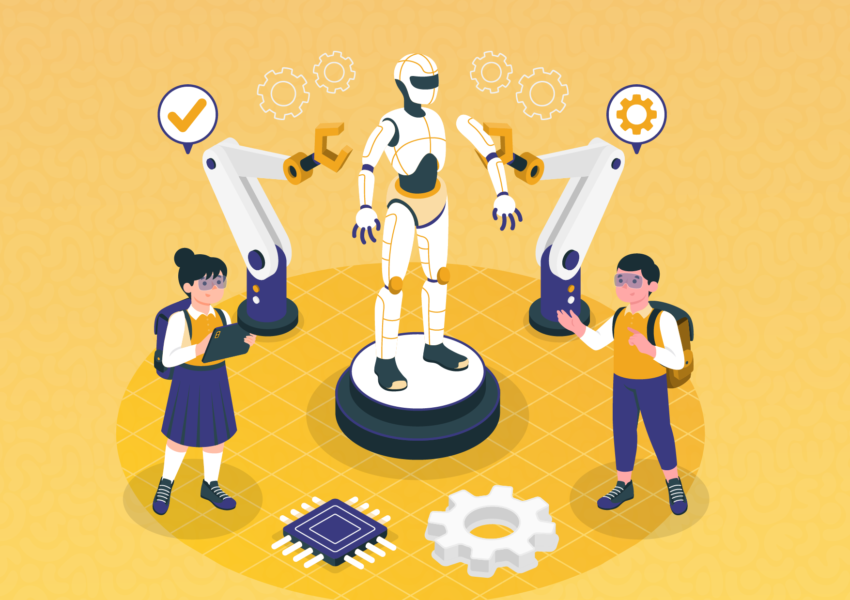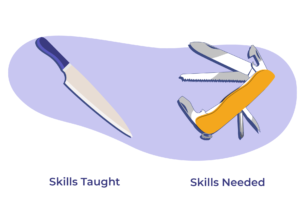
For the better half of human existence, it was merely about survival & human progress aligned with the pace of human evolution. This made the future of work & the skills one needs to navigate it more predictable. However, with technological breakthroughs predictability has been becoming hard. Take, for instance, the personal computer & the internet; it has changed everything around us. Considering that it has been around only for the last three decades as compared to the 2,00,000 years of human existence.
At this very moment, we are in a place with AI as we were with the internet two decades ago. So, is it safe to say that if we survived (or instead thrived) the internet era, we will get past the AI boom too?
It may not be that simple because, unlike the internet disruption, the pace at which AI is progressing is unforeseen. A study in 2023 conducted by OpenAI, a leading player in the AI race, revealed the astonishing impact AI could have on various industries. Their findings indicate that approximately 80% of the U.S. workforce could have at least 10% of their work tasks affected by the introduction of GPTs, while around 19% of workers may see at least 50% of their tasks impacted. This impact spans across almost every industry & at all levels within it.
Here’s a link to the findings of the study: https://arxiv.org/pdf/2303.10130.pdf
Adding to the difficulty are alarming statistics of the current workforce not being fully equipped digitally, let alone AI. An optimist, however, might argue that there might be some jobs lost initially but there will be more of them, like Prompt Engineering, that will get created.
But this is just one of the many disruptions awaiting us in this decade & is our curriculum really equipped to prepare students for the uncertain future?
We do not think so. This unpredictability further widens the skill gap. Sometimes even giving some privileged students an unfair advantage. How can we close the skill gap?
Introduce a diverse skill portfolio

To increase their chance of employment or to fuel their entrepreneurial aspirations, it is vital that the students are taught a wide array of skills. Covering both new-age skills (like AI, IoT, Space Technology, etc;) to core skills (like Communication, Life Skills, DIYing, etc;).
Dynamic Curriculum
A rapidly evolving curriculum that provides students unrestricted access to top mentors, tools, and resources. The curriculum has to cover skills that align with industry demands & real-world trends. We cannot aspire to put humans on the moon with a wooden fixed wing plane. This should also include affordable skilling options on a large scale. The National Education Policy 2020 (NEP 2020) reflects this vision, emphasising the need for a dynamic education system.
However, implementing such a framework poses challenges,
- Lack of infrastructure: As of 2022, only 30% of Indian schools had internet access, and only 50% had operational computers. Building the infrastructure is the first step towards making a digital-first nation.
- Trained teaching resource: India (and most other parts of the world, too) has a severe teacher crisis, with us needing 3.3 million more higher education faculty by 2035, considering a teacher-student ratio of 1:15. Even if we find people to fill these spots, the challenging of training & upskilling them is a mammoth task.
- Lack of exposure to real-world trends & demands: The teaching staff & educators lack exposure to current trends in the industry.
- Outdated curriculum & slow-paced implementation: Even if the educators had exposure to current trends, they are forced to follow a curriculum that is outdated. Though with NEP 2020, things are set to change for the better; in a country with such a vast population & all the red taping, the implementation of new strategies happens at snails-pace.
All hope is not lost. Ulipsu can help schools overcome these mammoth challenges. Harnessing technology, we can deliver high-quality learning content across diverse skills to any corner of the planet. Our courses are dynamic, mapping to both the curriculum and real-world needs. With very minimal infrastructural upgrades, schools will be able to make the best of learning accessible to their students. The only way to ensure a diminished skill gap is by upskilling young ones.